February Debate
February 10, 2021
Do You Smell The Blood On Your Hands?: How Eating Meat Is Unethical.
By Sakshi Palav
As you sit at your dining table drinking milk or chewing away at your roasted beef with potatoes, take a moment to reflect on how your favorite animal products ended up in your kitchen. Let me save you some time. They are abused, proded, and killed. So, Is it ethical to eat meat knowing it endorses the torture and slaughtering of animals?
The discussion about what is ethical and what is not is a difficult one. The guidelines of what is considered ethical and unethical are created by humans, as a society. And, as we have been consuming meat since the dawn of time, eating meat is something that is deemed as normal, thus acceptable, rather than immoral or unethical. However, why do we deem the slaughtering of animals acceptable? Is it because we believe it is necessary for our health or is it just because it tastes yummy?
Say I considered that you only resort to eating meat because it’s “good” for you, that you only eat meat out of survival. Well, the meat industry has long sold us animal products under the claim that meat and milk are healthy, and needed, for human survival. We are told that the milk will increase our bone strength and help us grow, while the meat will keep our blood and tissue strong. That is a lie. According to Harvard Health, red meat, which are meats like pork and beef, are severely damaging to the human body. Not only do they increase the risk of cancer, type two diabetes, and osteoporosis, but also lead to heart disease because of how heavy the meat is with its high amounts of cholesterol and artery blocking thickness. Also, the only reason milk is marketed as a bone strengthener is because it contains calcium, but veggies like kale and spinach carry calcium as well.
So, now that eating meat because it’s good for you can’t possibly be an option, let’s say you eat meat because it tastes yummy. What makes it taste so yummy? Is it the fact that the female cattle are forcefully inseminated with metal rods so you can keep eating a pound of meat a day? Oh, or is it the fact that your burger pooped two days ago because it was scared standing in the ‘to-kill’ line?
In order to produce and supply the demand of meat that families consume throughout America, the meat industry turns to forced impregnations, separations of sows and their calves, and slaughterhouses. Countless videos have been leaked exposing industrial farms branding, abusing, and mishandling their cattle. Yet the meat industry is still widely supported. Why? Why do we not care that living things are tortured in order for us to be able to eat a chicken taco or a steak? Simply put, because we are selfish beings.
As humans, we have been trained to believe that we are superior compared to other species because of our technological and social advancements. That the killing of a human means 10x more than the killing of another animal. That the life of a human is worth more than a life of another animal. That they are not the same, so there is no harm in killing cows, chickens, and pigs for food. However, we fail to remember that we too are animals who somehow advanced beyond simple life.
Let’s also consider that maybe you just don’t have the money to be eating vegetarian. Well, surprise! We’re not considering it because it’s not true. At a traditional fast food restaurant like Taco Bell, the vegetarian options are less expensive than the meat options. If you were to buy a bean burrito from Taco Bell it would cost you $1.29, but say you wanted to substitute beans with chicken, it would now be $1.49 cents more. A whole dollar and 49 cents extra to eat chicken. Also, at a grocery store like Walmart, a basic pack of boneless chicken would be $2.98 a pound, and as one pack is around four pounds, the total cost would be $8.49. The same goes for beef being $5.47 a pound, but $14.28 all together. That dinner, excluding the rice and vegetables you would serve with it is already ranging from $8 to $15. However, if you were to buy vegetables for a vegetarian dinner, the most it would cost for a six pack of canned veggies of 14.5 ounces would be $5.70 and $4.00 for any pound of fresh veggies. An example is four avocados being only $3.28 at Walmart.
Plus, vegetarian dishes like pasta and vegetable soup don’t need many ingredients, meaning your groceries would last you for more than one meal, unlike fast food hamburger deals and grocery one steak packs. And, as prices always seem to fluctuate, I understand the misconception of thinking healthy equals expensive. But, unless you’re trying to only buy crazy, top notch organic fruits and vegetables, eating healthy is not as expensive as everyone paints it out to be.
It should also be noted that the meat industry horribly impacts the environment. According to the Greenpeace Organization because of cattle needing to graze, and because there are billions of cattle to feed, most intensive factory farms get their crops from the Amazon.
Yes, the Amazon in South America, and yes, the farms do cause the deforestation of the Amazon to feed their cattle. Also, as these farms accelerate deforestation, they also add to global warming with the amount of greenhouse gases deforestation releases. This is not even including how the industry requires huge amounts of land to sustain and how much water the cattle require.
Even as I struggle with fully committing to being vegetarian, I understand how it’s not appealing to drop everything, go buy organic cheddar for $9, and never eat lamb again. But, I find that eating lamb chops and rice knowing an animal died just so I could eat this is even less appealing.
Humans, time and again, have a pattern of justifying issues that don’t directly affect them. It is seen in our justification of social issues like colonization and war and in environmental issues like deforestation, climate change, and now the meat industry.
As we continue to eat meat, we continue to support the abuse of innocent animals. We continue to support the release of greenhouse gasses into the atmosphere. We continue to support ignoring climate change. We continue to support the death of a living, breathing animal just so we can take two bites of a double deck cheeseburger.
There is nothing ethical about supporting the torture and mass murder of animals for the pleasure of having a meal. There is no sustainable way to eat something that requires being forcefully impregnated, bred, or killed. We should value life more than that.
Food for Thought: Eating Meat isn’t the Problem
By Diana Garza
When you sit down for dinner, what do you typically eat? Perhaps it’s grandma’s enchiladas, creamy pasta, or just Taco Bell. Whatever it is, the probability of there being meat on the menu is very high. Yet, is the slaughtering of other animals for the benefit of our taste buds ethical? I say yes, it has to be.
Since the dawn of man, humans, as well as a variety of other species have hunted for meat. Hunting is a natural recurring phenomenon throughout nature. Of course, as humanity has evolved and grown quite complex, the meat industry has progressed right along with us. No longer is hunting a sacred or small scale operation, but a very grand one involving corporations, land masses, and a lot of money.
Some would argue that this “bigness” has corrupted meat eating, that raising animals in not so wholesome conditions only to be slaughtered is evil. And, I would agree. Such inhumane practices are vile. But this kind of exploitation is a common theme among numerous industries. If it’s not meat then it’s fashion, medicine, or dairy, ect. These businesses rely on child labor, animal testing, and much more sinister factos such as forced labor. Why is it that meat eating is immoral when the manufacture of most goods relies on unethical practices as well?
Now, I’m not going to go on and argue that this is the way of our world. Or that because everyone else is doing so, it must be okay. Because in reality, this corruption surrounding the means of production needs a very intense makeover. The point is, I don’t think eating meat makes me an immoral person, but denying the evils of the industry does.
Influencers and lifestyle advocates love to preach about veganism, vegetarianism, and the ethics behind it all. They go on and on about their avocado toast and moral superiority. But, I would like to remind everyone that such diets and practices are unattainable for most of the middle class or those in poverty. For families struggling to provide, it’s much easier to purchase from the McDonalds Dollar Menu, rather than buy two avocados for five dollars. Not to mention, those who are hustling to provide don’t have the leisure to spend hours at groceries stores. It’s an in and out process because you probably have kids with you, or waiting for the parent they hardly see all week. When you’re just trying to feed your family, you also tend to buy bulk. You’re thinking what can I afford with x amount of money that will last my family all week. When struggling parents have to make their less-than-fabulous incomes last, they’re not picky about what they’re eating. Also at least 50% of students in California receive free or reduced lunch, and about 22 million children nationwide rely on school lunches for at least one meal. These families who don’t know if there’s food at home are not going to be picky about what they eat. Perhaps that is the unethical situation, that only those with modest living conditions can afford to view meat eating as scandalous.
Regarding eating habits, Edward Cullen once said, “It’s like a human only living on tofu. It keeps you strong, but you’re never fully satisfied.” I am not going to lie, I really do like meat, and perhaps that is selfish. But I don’t value my satisfaction over the lives of animals. Being aware of where your goods come from is the first step of ethical consumption. If you have the luxury of choice, of choosing what and where you eat, then by all means don’t gorge out on wretched meat production products.
Eating meat is natural. It is not some wicked immoral act. Humans are always evolving, if we can purify the meat industry and its effects on the environment then that is evolution well done. Creating “happy farms” with well treated animals is also a major step in the right direction. In order to consume ethically, I believe we must improve the means of production, whether that be labor or environmental effects. Respecting and being conscious of the value of life is important. Simply put, meat consumption is an organic aspect of life, it is not unethical.
I don’t feel guilty when I eat bacon, but I will continue to fight for a righteous industrial community.
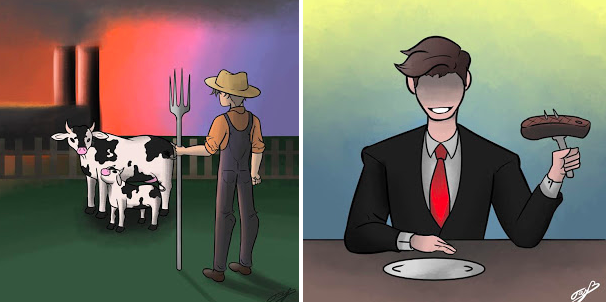



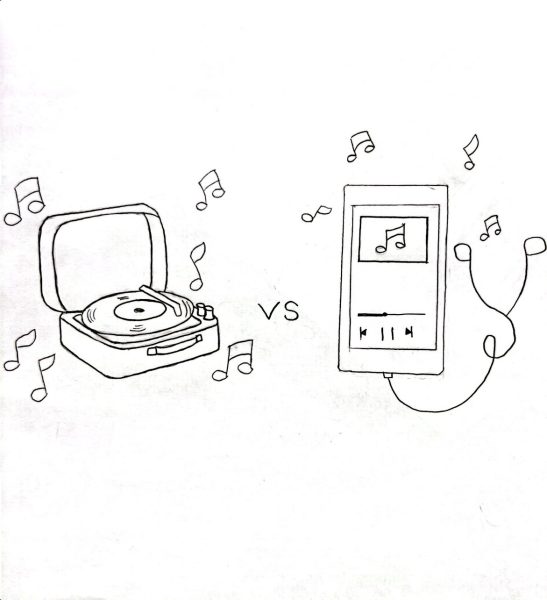
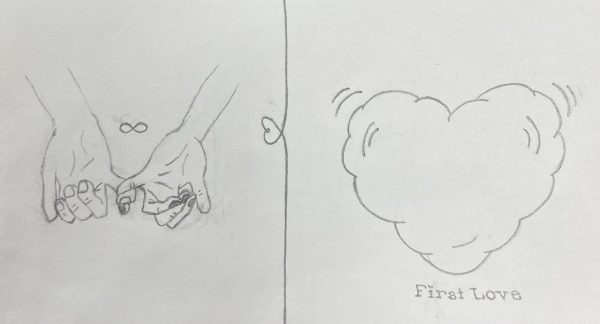
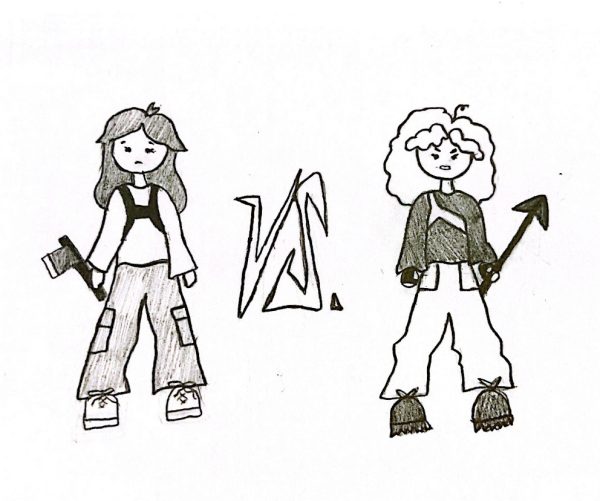


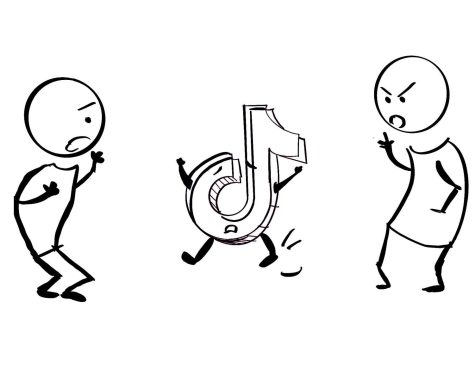

Victoria Juarez • Feb 18, 2021 at 6:53 pm
This was a great topic! I thought they were both well written. Your headlines were so good! You both were very articulate.
lovleen • Feb 17, 2021 at 9:50 am
ahhh, I loved this topic!! I really had a great time viewing things from both of your perspectives! This was soo WELL-WRITTEN!!
chloe • Feb 10, 2021 at 9:32 pm
such a great topic! i really enjoyed reading both of your POVs. your headlines were so creative!! well done.